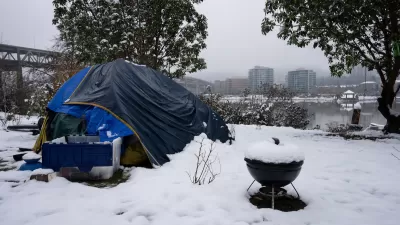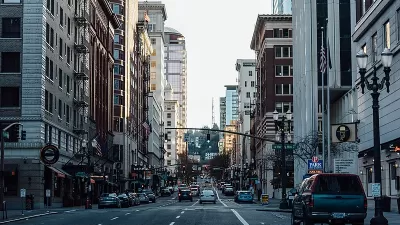Three in 100 people in Portland are homeless.

"One in every two arrests made by the Portland Police Bureau last year was of a homeless person," report Rebecca Woolington and Melissa Lewis.
That conclusion followed analysis by the The Oregonian/OregonLive.
"The number of arrests is dramatically disproportionate to Portland's homeless population. People experiencing homelessness represent a tiny fraction of the city's overall population -- well below 3 percent even using the biggest estimates," explain Woolington and Lewis. "Yet in 2017, they accounted for 52 percent of arrests."
The statistics raise several questions. One is whether it is constitutional to criminalize homelessness with such stark severity. Another is about the costs to social welfare that police spend so much time dealing with such a small portion of the population. Another is whether this approach could possibly solve the problem. Tristia Bauman, senior attorney for the National Law Center on Homelessness & Poverty, is quoted in the article saying this response is "wholly ineffective."
According to the article, the number of arrests of homeless people "has grown amid calls from Portland business and neighborhood leaders for police to stop street-level crime, such as disorderly conduct and drug use, outside their front doors."
FULL STORY: Portland homeless accounted for majority of police arrests in 2017, analysis finds

Alabama: Trump Terminates Settlements for Black Communities Harmed By Raw Sewage
Trump deemed the landmark civil rights agreement “illegal DEI and environmental justice policy.”

Planetizen Federal Action Tracker
A weekly monitor of how Trump’s orders and actions are impacting planners and planning in America.

Why Should We Subsidize Public Transportation?
Many public transit agencies face financial stress due to rising costs, declining fare revenue, and declining subsidies. Transit advocates must provide a strong business case for increasing public transit funding.

Judge Orders Release of Frozen IRA, IIJA Funding
The decision is a victory for environmental groups who charged that freezing funds for critical infrastructure and disaster response programs caused “real and irreparable harm” to communities.

‘Clybourne Park’ Sets Stage for Housing Equity Discussions
Clybourne Park, a play exploring race, real estate, and community tensions, can set the stage for discussion on the lasting impacts of housing discrimination, gentrification, and the fight for affordability.

Understanding Road Diets
An explainer from Momentum highlights the advantages of reducing vehicle lanes in favor of more bike, transit, and pedestrian infrastructure.
Urban Design for Planners 1: Software Tools
This six-course series explores essential urban design concepts using open source software and equips planners with the tools they need to participate fully in the urban design process.
Planning for Universal Design
Learn the tools for implementing Universal Design in planning regulations.
Caltrans
Smith Gee Studio
Institute for Housing and Urban Development Studies (IHS)
City of Grandview
Harvard GSD Executive Education
Toledo-Lucas County Plan Commissions
Salt Lake City
NYU Wagner Graduate School of Public Service




























